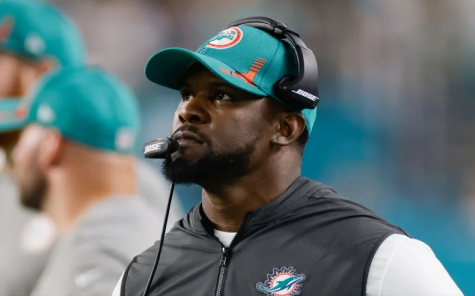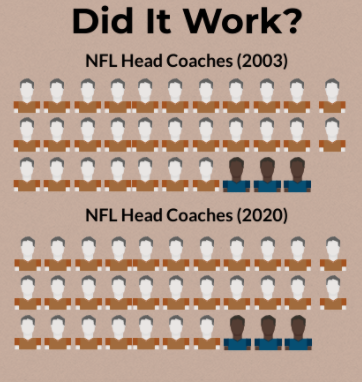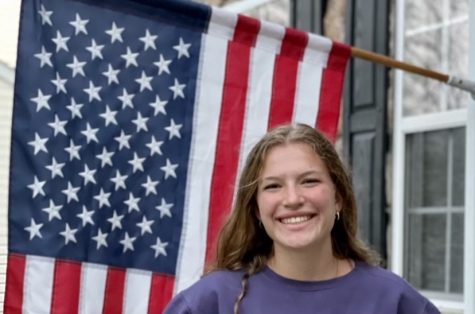The NFL: Dealing with Racial Inequality
Two weeks after Super Bowl LVI, the National Football League continues to deal with a growing concern, larger than football, surrounding race and head coaching. Brian Flores coached the Miami Dolphins during the 2019-2022 seasons with a 24-25 (.490) overall…
February 17, 2022
Two weeks after Super Bowl LVI, the National Football League continues to deal with a growing concern, larger than football, surrounding race and head coaching. Brian Flores coached the Miami Dolphins during the 2019-2022 seasons with a 24-25 (.490) overall record. The Dolphins terminated Flores on January 10, 2022 after finishing the season 9-8. It was their second season with a winning record, but again not enough to qualify for playoffs. Flores and the Dolphins never made it to the playoffs, which does play a role in his dismissal. However, Flores led the Dolphins to back-to-back winning seasons for the first time since 2003. It may be argued that Flores 9-8 2022 record was “too little, too late”, as the Dolphins started their season at 1-7 and finished on an 8-1 run.
![]()
The NFL does have a Rooney Rule in place, supposedly to provide more opportunities to people of color. Citing the NFL’s website under The Evolution of the Rooney Rule “In 2021, the NFL approved changes requiring every team to interview at least two external minority candidates for open head coaching positions and at least one external minority candidate for a coordinator job. Additionally, at least one minority and/or female candidate must be interviewed for senior level positions (e.g., club president and senior executives).” They have tried to increase the number of diverse hirings through this new policy, but the recent lawsuit by Flores presents a different story.
Flores, a Black man, feels as though his recent firing as well as rejection from the openings of the Giants and the Texans head coaching job stems from his race, rather than his qualifications. His lawsuit states, “In certain critical ways, the NFL is racially segregated and is managed much like a plantation” which is an extremely powerful statement describing the intimate inner workings of the current NFL. The owners of the 32 NFL teams are frequently criticized for prioritizing profit over the players’ wellbeing. None of the 32 owners are Black, in a professional sport where 70% of its players are Black. Flores believes that both his interview with the Broncos in 2019 and his interviews in 2022 were just “checking the box” on the Rooney Rule requirements.
Another issue involves Flores’s confusion of his dismissal based on his poor performance. Flores states that he was supposedly paid by the team’s owner to lose. Citing the lawsuit itself, Flores was told by Dolphins owner Stephen Ross, “[Ross] would pay [Flores] $100,000 for every loss, and the team’s General Manager, Chris Grier, told Mr. Flores that “Steve” was “mad” that Mr. Flores’ success in winning games that year was “compromising [the team’s] draft position.” Flores feels frustrated because he was hired to win and then he claims in his lawsuit he was paid to lose. However, when he did begin winning again it was negatively received by the ownership team. This adds complexity to the lawsuit as the argument portrayed by the Dolphins that the poor performance of Flores led to his firing cannot be truly argued as he states that he was paid to lose.

Because of recent criticism of the aforementioned Rooney Rule, the NFL adapted its rules in 2020 to mandate an interview of at least two minority candidates not currently associated with the team to fill a head coaching position. The other addition, “one minority candidate has to be interviewed for coordinator positions as well as high-ranking positions in the front office, including the general-manager role” is supposedly going to increase the number of Black hires.
On February 6, 2022, the Miami Dolphins hired Mike McDaniel, a biracial man, as their new head coach. This fulfilled the diversity hiring qualifications in the NFL. McDaniel was the San Francisco 49ers offensive coordinator. Since he was hired by the Dolphins, the 49ers in turn receive two compensatory third-round picks split between the 2022 and 2023 NFL Drafts’. The NFL rewards teams who develop minority assistant coaches into either head coaches or general managers. This adds a level of intrigue to the Flores lawsuit as the Dolphins just hired a biracial coach.
In the NFL, offensive coordinators oftentimes become head coaches. In the league today, most successful head coaches are the ones who focus on the offense, with a few exceptions such as Bill Belichick of the New England Patriots (321-156 through his career), Mike Tomlin of the Pittsburg Steelers (154-85-2 throughout his career), and Sean McDermont of the Buffalo Bills (52-36 through his career); three unique situations where the record of the head coach is drastically over .500. Other defensive-minded coaches during the 2021-22 season included Vic Fangio previously of the Denver Broncos (fired this offseason/7-10), Robert Saleh of the New York Jets (4-13), Ron Rivera of the newly named Washington Commanders (7-10), Mike Zimmer of the Minnesota Vikings (fired this offseason/8-9), and Dan Campbell of the Detroit Lions (3-13-1). This highlights the challenges teams have with defensively-focused head coaches.

Only 21% of NFL Offensive Coordinators are Black, whereas 59% of offensive coordinators are white. This brings a noticeable discrepancy into the forefront. The offensive nature of the current NFL has led to many head coaching vacancies going to offensive coaches. This may be what leads to more head coaches who are white being hired. Prior to becoming a head coach, Flores primarily focused on the defensive side of the game. And the vast majority of these offensive coaches are white. How can the NFL increase the number of Black head coaches when there are so few Black offensive coordinators?
The NFL must take clear definitive steps to acknowledge the discrepancies while dealing with racial inequality. Hopefully, the requirements they have to stimulate the development of minority candidates, as well as the interview requirements, will increase the number of minority offensive coordinators and future head coaches in the NFL. It is up to the NFL, its owners, the players and coaches, as well as the fans to determine the steps to be taken to better diversify coaching in the NFL. The Brian Flores lawsuit prompts a call to action for the NFL to improve their diversity hirings.




